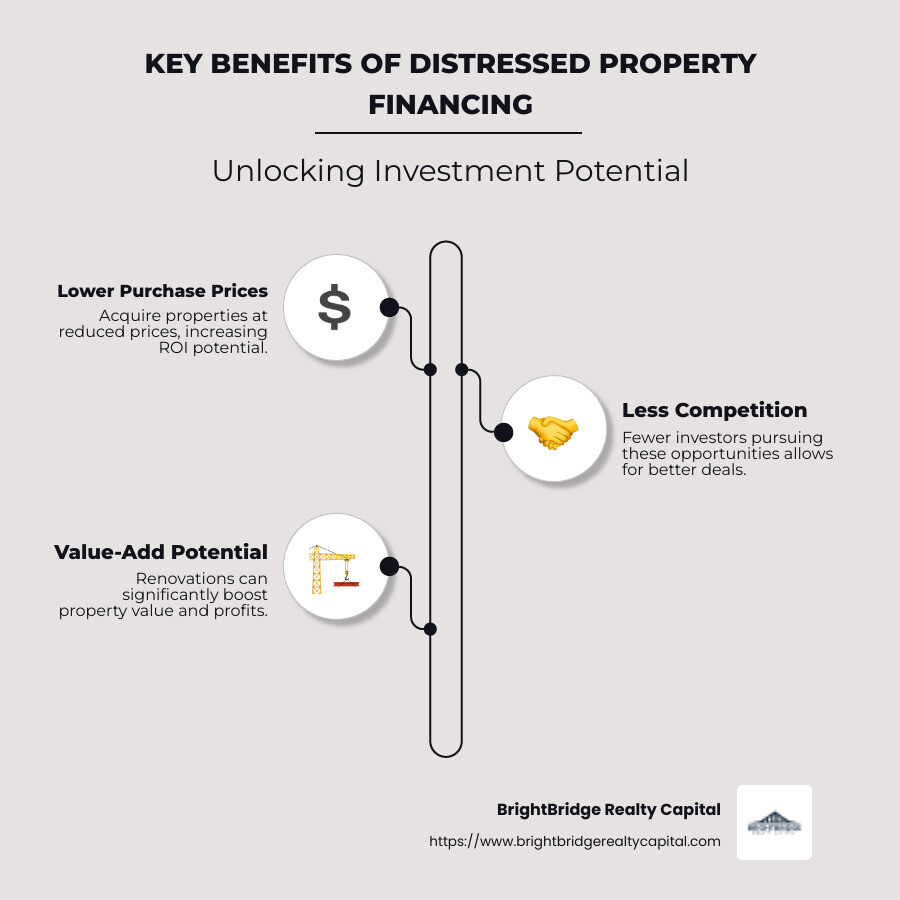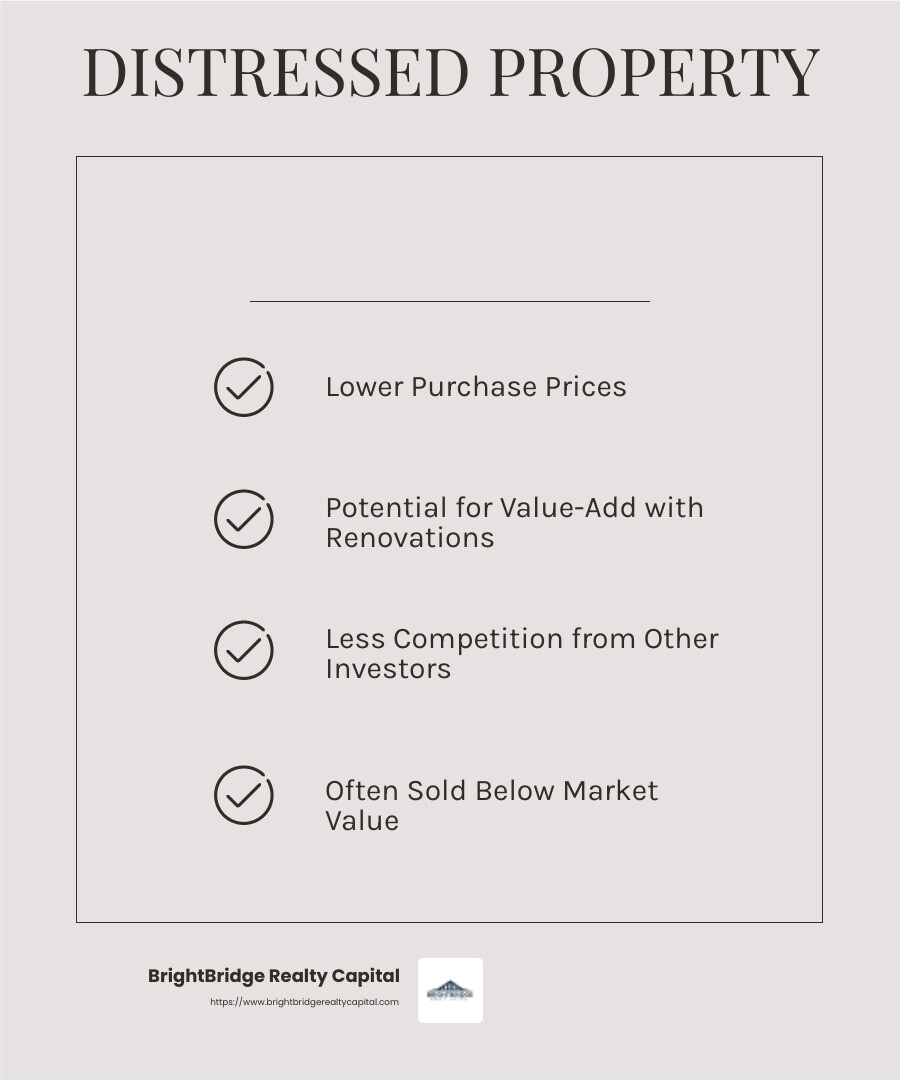Financing Distressed Properties: A How-To Guide for Investors

When it comes to distressed property financing, quick and strategic action can open up promising investment opportunities. Whether you're eyeing a promising fix-and-flip deal or expanding your rental portfolio, distressed properties present unique advantages and challenges.
Here's what makes distressed property financing appealing to investors:
- Lower Purchase Prices: Distressed properties often come with reduced prices, allowing for higher return potential.
- Less Competition: Many investors shy away from these properties, leaving more opportunities for those willing to take the plunge.
- Value-Add Potential: Renovating a distressed property can significantly increase its market value, turning a profit on the resale or boosting rental income.
These properties, often in need of TLC, can be gold mines for those who know how to steer the financing landscape efficiently. Understanding distressed property financing not only helps achieve fast closings but also ensures competitive rates, allowing investors to capitalize on these opportunities swiftly and successfully.

Distressed property financing terms to learn:
Understanding Distressed Properties
Distressed properties are real estate assets that are in financial trouble. They can be a great opportunity for investors because they often sell below market value. But, they come with their own set of challenges.
What is a Distressed Property?
A distressed property is one that is either on the brink of foreclosure or has already been taken over by the bank. These properties are often sold at a discount because the owner needs to sell quickly, usually due to financial hardship.

Foreclosures
Foreclosures happen when homeowners can't make their mortgage payments. When this happens, the lender takes back the property. The lender then sells the property, often at an auction, to recover the unpaid loan amount.
- Auction Sales: Properties are often sold at auctions, where buyers can get them at a reduced price.
Real Estate Owned (REO) Properties
If a foreclosure property doesn't sell at auction, it becomes a Real Estate Owned (REO) property. These are properties owned by the bank. Banks usually want to sell these quickly to avoid maintenance costs.
- Bank-Owned: Since banks aren't in the business of holding properties, they might sell these at a discount.
Why Invest in Distressed Properties?
Investing in distressed properties can be profitable. Here’s why:
- Lower Prices: These properties often sell for less, allowing investors to buy at a discount.
- Value-Add Potential: With some renovation, these properties can increase in value, offering a good return on investment.
- Less Competition: Many investors avoid distressed properties due to the perceived risks, which can mean less competition for those willing to take them on.

Understanding these types of properties is crucial for investors looking to enter the distressed property market. With the right strategy and financing, these properties can become lucrative investments.
Advantages of Investing in Distressed Properties
Investing in distressed properties offers several unique advantages that can make them appealing to savvy investors. Let's explore the key benefits:
Lower Purchase Price
One of the biggest draws of distressed properties is their lower purchase price. These properties are often sold below market value because the owners, whether individuals or banks, need to sell quickly. This urgency often leads to significant discounts.
- Case in Point: In the case of foreclosures, properties are frequently auctioned off at reduced prices to recover the unpaid loan amounts. Similarly, banks aim to offload Real Estate Owned (REO) properties swiftly to avoid ongoing maintenance costs.
This means investors can acquire properties for much less than their market value, providing a strong foundation for future profits.
Less Competition
Distressed properties often come with perceived risks, which can deter many potential buyers. This results in less competition compared to traditional property markets.
- Example: While traditional buyers might shy away from the uncertainties of distressed properties, investors who are well-prepared and informed can capitalize on the reduced competition. This can lead to better negotiating power and more favorable purchase terms.
With fewer bidders vying for the same property, investors have a better chance of securing a great deal.
Value-Add Potential
Another attractive feature of distressed properties is their value-add potential. These properties are often in need of repairs or renovations, presenting opportunities for investors to increase their value significantly.
- Success Story: Consider the Turnaround Warehouse, a distressed property that was purchased at a low price and transformed into a profitable asset through strategic renovations. By upgrading facilities and enhancing aesthetics, investors can substantially boost a property's market value.
This potential for improvement allows investors to generate higher returns, either through reselling at a profit or by renting out the improved property.
Understanding these advantages can help investors make informed decisions when considering distressed property financing. With the right approach, these properties can be turned into lucrative investments.
Risks and Challenges in Distressed Property Investment
Investing in distressed properties can be rewarding, but it's not without its problems. Let's explore some of the key risks and challenges investors might encounter:
Uncertain Property Condition
A challenge is the uncertain condition of the property. Distressed properties often suffer from neglect or vandalism, which can lead to hidden issues.
- Example: The Troubled Office Building in St. Louis is a cautionary tale. Emily, the investor, finded unforeseen problems like outdated HVAC systems and water damage, which significantly increased her renovation costs.
These unexpected repairs can quickly eat into your budget, so thorough inspections and realistic budgeting are crucial.
Legal Complications
Distressed properties often come with legal and financial problems. This can include liens, title issues, or unpaid taxes that complicate the buying process.
- Fact: According to the research, legal complications can add time and cost to the acquisition process. In some cases, they might even prevent the purchase altogether.
Conducting comprehensive due diligence is essential to uncover and address these issues before proceeding with an investment.
Market Volatility
The market for distressed properties is more vulnerable to economic fluctuations than the traditional real estate market. This volatility can affect property values and rental demand.
- Insight: Market shifts can be unpredictable. For instance, the commercial office market has seen significant downturns due to changing work habits, impacting the viability of investments like Emily's office building.
Investors should remain vigilant and adaptable, keeping a close eye on market trends and being prepared for potential shifts.
By understanding these risks, investors can better steer the complexities of distressed property investing. Armed with this knowledge, you'll be better equipped to make informed decisions and mitigate potential pitfalls as you explore distressed property financing options.
Distressed Property Financing Options
When it comes to distressed property financing, investors have several avenues to explore. Each option comes with its own set of benefits and challenges, so it's important to understand how they align with your investment strategy.
Hard Money Loans
Hard money loans are popular among investors looking to quickly acquire distressed properties. These short-term loans are provided by private lenders, making them easier to qualify for than traditional bank loans. However, they often come with higher interest rates and shorter repayment terms.
- Use Case: Ideal for investors who plan to fix and flip properties quickly. The fast approval process allows you to seize opportunities before they slip away.
Private Money Loans
Private money loans are similar to hard money loans but often come with more flexible terms. These loans are usually provided by individuals or small groups rather than institutional lenders.
- Benefit: Lower interest rates can be negotiated, especially if you have a strong personal relationship with the lender. This makes private money loans a good option for those with a robust network.
Bridge Loans
Bridge loans serve as temporary financing solutions, helping investors cover the cost of acquiring and renovating a distressed property before securing long-term funding.
- Advantage: They allow you to act quickly in a competitive market, providing the necessary capital to close deals while you arrange more permanent financing.
Traditional Bank Loans
While less common for distressed properties, some investors may still opt for traditional bank loans. These loans are typically available to those with a strong investment track record and a clear exit strategy.
- Consideration: Banks have stricter qualification criteria, and the approval process can be lengthy. However, they often offer more favorable interest rates compared to private lending options.
Each of these financing options can play a crucial role in your investment strategy. It's essential to weigh the pros and cons of each to determine which best suits your needs. By understanding these options, you can better steer distressed property investment and secure the funding necessary to capitalize on these unique opportunities.
How to Secure Distressed Property Financing
Securing distressed property financing can be a straightforward process if you know the steps to take. Here's a simple guide to help you steer the process.
Loan Prequalification
Prequalification is a crucial first step. It gives you an estimate of how much you can borrow and shows sellers you're a serious buyer. To get prequalified, you'll typically need to provide basic financial information like your income, debts, and credit score.
- Tip: Prequalification can speed up your financing process, allowing you to move quickly when you find the right property.
Quick Funding
Quick funding is often essential in distressed property deals. These properties are usually sold below market value, and competition can be fierce. Hard money loans and bridge loans are popular for their fast approval times.
- Fact: Some private lenders can provide funds in a week or less, letting you seize opportunities before they disappear.
Flexible Terms
Having flexible terms can make all the difference in distressed property financing. This flexibility can come in the form of interest rates, repayment schedules, or loan conditions.
- Example: Private money loans often offer negotiable terms, which can be custom to fit your specific investment strategy.
Securing financing for distressed properties doesn't have to be complicated. By understanding and utilizing these strategies, you can position yourself to act quickly and effectively in the market.
Frequently Asked Questions about Distressed Property Financing
What is distressed property financing?
Distressed property financing refers to the various loan options available to investors who want to purchase properties that are in foreclosure, bank-owned, or sold at a discount due to financial duress. These properties often require quick action and specialized funding solutions because traditional loans might not be available due to the property's condition or the urgency of the sale.
- Fact: Distressed properties can offer significant investment opportunities but often come with risks like uncertain property conditions and legal complications.
How do I find distressed properties?
Finding distressed properties can be a rewarding endeavor if you know where to look. Here are some common methods:
Foreclosure Auctions: These are public sales where foreclosed properties are auctioned off to the highest bidder. It's a competitive environment, so be prepared.
Real Estate Owned (REO) Listings: Banks and lenders often list properties they have repossessed on their websites or through real estate agents.
Short Sales: These occur when a homeowner sells their property for less than the amount owed on the mortgage, usually with the lender's approval.
Tip: Drive around neighborhoods or use online platforms to spot potential distressed properties.
What are the best financing options for distressed properties?
When it comes to financing distressed properties, several options stand out:
Hard Money Loans: These are short-term loans from private lenders, known for quick approvals and higher interest rates. Ideal for investors who plan to flip properties.
Private Money Loans: Similar to hard money loans but often come with more flexible terms. These are usually provided by individuals or small groups.
Bridge Loans: Short-term loans that help cover the gap between buying a property and securing long-term financing.
Traditional Bank Loans: While less common for distressed properties, they might be an option if you have a strong financial profile and a clear exit strategy.
Example: An investor might use a bridge loan to quickly purchase a distressed property, renovate it, and then refinance with a traditional mortgage once the property's value has increased.
Understanding these options can help you choose the right financing strategy for your investment goals.
Conclusion
Investing in distressed properties can be a rewarding venture, but it requires the right financial partner to steer the complexities involved. That's where BrightBridge Realty Capital comes in.
With our expertise in direct lending and commitment to fast closings, we make the process of securing financing for distressed properties as seamless as possible. Our services are designed to help you act quickly in a competitive market, giving you the edge you need to succeed.
At BrightBridge, we understand that every investment is unique. That's why we offer customized loan solutions custom to your specific needs. Our nationwide reach ensures that no matter where your investment properties are located, you have access to the capital you need.
Our direct lending approach eliminates the middleman, providing you with competitive rates and a streamlined process. We pride ourselves on our ability to close deals quickly—often within a week—so you can focus on what matters most: changing your distressed property into a profitable investment.
Ready to take the next step in your real estate investment journey? Explore our loan options and see how BrightBridge Realty Capital can help you bridge the gap to success.


